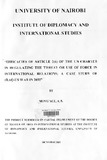| dc.contributor.author | Mung’ale, A. N. | |
| dc.date.accessioned | 2016-05-05T15:42:06Z | |
| dc.date.available | 2016-05-05T15:42:06Z | |
| dc.date.issued | 2005 | |
| dc.identifier.uri | http://hdl.handle.net/11295/95467 | |
| dc.description.abstract | The international legal system built in 1945 was founded under the essential proscription on the threat or use of force in international relations. This principle has been long recognized as part of customary international law and as a rule of jus cogens binding all States, is contained in Article 2(4) of the United Nation (UN) Charter and was reinforced by a system of collective security measures included in Chapter VII of the same Charter. Indeed, there is general conformity on the main principles that comprise the law on the use of force and its two recognized exceptions: the collective use of force by the Security Council and the individual or collective self-defense by member states.
States have not complied in every respect with the ban expressed in Article 2(4) of the UN Charter. The case study demonstrates how states fail to comply with the UN Charter in pursued of perceived national interests. The United States (US) and its allies justified their invasion of Iraq in 2003 as preemptive self-defense, Iraq’s failure to comply with all or any of the existing 23 UN Security Council Resolutions and that Resolution 1441 justified use of force against Iraq. However, the use of force against Iraq was not justified under international law unless Iraq mounted a direct attack on the US; one of its allies requested the US’s assistance; an attack by Iraq on the US or one of its allies was imminent and could be averted in no way other than by the use of force; or the United Nations Security Council authorized the use of force in clear terms. None of the above factors occurred to justify war Iraq in 2003. Therefore, the Iraq war in 2003 was illegal, breached Article 2(4) of UN Charter and had no justification in international law.
The study attempted to prove that despite lack of total compliance with Article 2(4) of the UN Charter in regulating use of force in international relations, the Article is effective in regulating resort to war in contemporary world despite breaches of the Article by some states. The Iraq-US war was illegal and breached Article 2(4) of the UN Charter. | en_US |
| dc.language.iso | en | en_US |
| dc.publisher | University of Nairobi | en_US |
| dc.rights | Attribution-NonCommercial-NoDerivs 3.0 United States | * |
| dc.rights.uri | http://creativecommons.org/licenses/by-nc-nd/3.0/us/ | * |
| dc.subject | use of force in international relations | en_US |
| dc.title | Efficacies of Article 2(4) of the Un Charter in Regulating the Threat or Use of Force in International Relations; a Case Study of Iraq-us War in 2003” | en_US |
| dc.type | Thesis | en_US |



